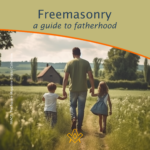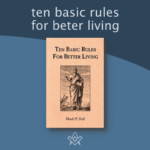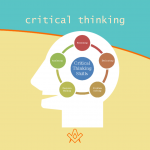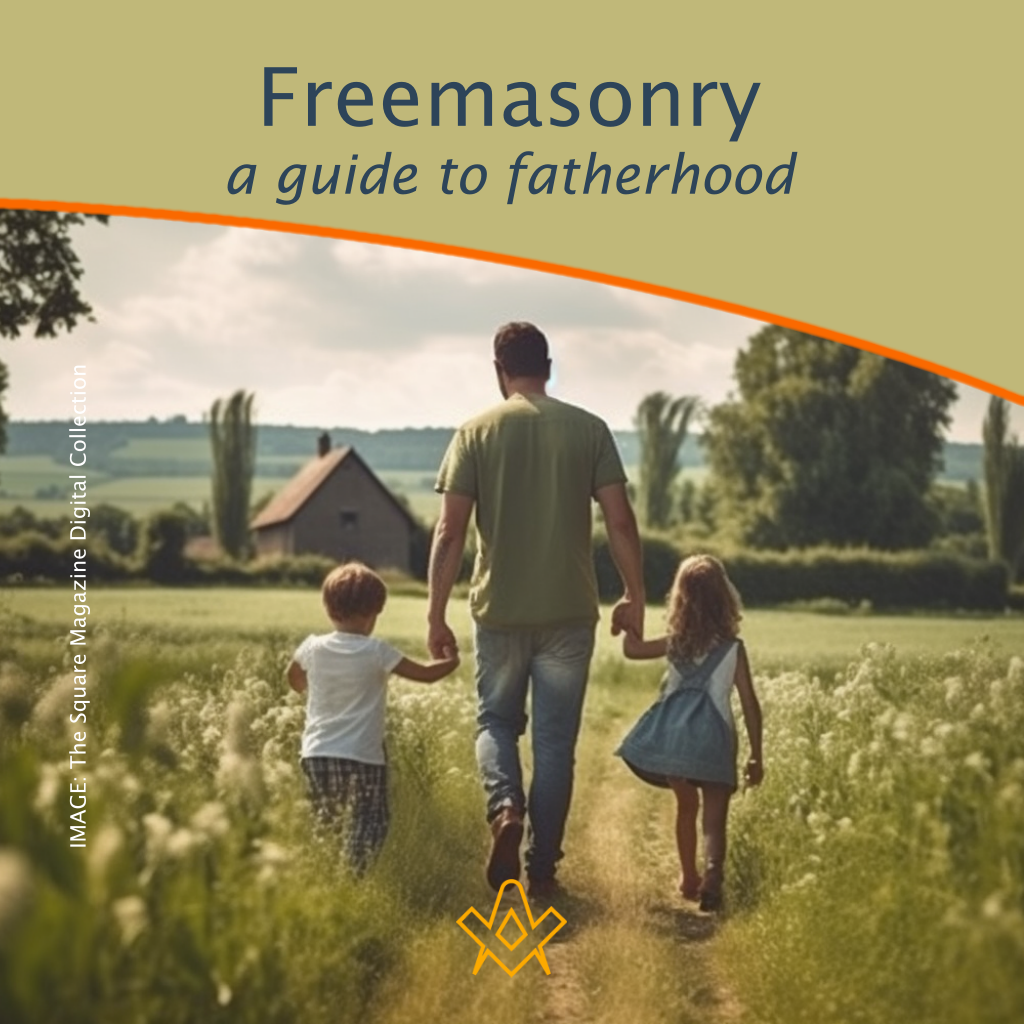In a world full of distractions and challenges, the role of a father can be both rewarding and complex. Striving to be strong, nurturing, and present, fathers often seek guidance on how to navigate the delicate balance between their personal lives and their responsibilities as parents.
It is in this pursuit of personal and parental growth that many fathers find solace and support in an unexpected source: Freemasonry.
Providing a Moral Compass
One of the fundamental aspects of Freemasonry is the instillation of strong, moral values. Freemasons are guided by principles such as integrity, honesty, and charity which can greatly impact their approach to fatherhood.
The fraternity offers a path towards personal growth and development, fostering an environment where fathers can learn to control their emotions and temper. By setting a good example of morality not only within their Masonic circles but also in their day-to-day lives, fathers are able to teach their children valuable life lessons.
Through symbolic morality plays, Freemasons are able to convey these values in a unique and engaging manner. Similar to a theatrical production, these plays use metaphors and allegories to convey important lessons to its members. Fathers who are Freemasons can draw from the lessons learned during these plays to teach their children about the meaning of integrity, honesty, and charity.
a) By demonstrating integrity: A father can provide a moral compass by consistently demonstrating honesty and integrity in his actions and decision-making. He can teach his children the importance of being truthful, even in difficult situations, and show them the value of doing the right thing, even when it’s not the easiest path to take.
b) By teaching empathy and compassion: A father can instil a sense of empathy and compassion in his children by encouraging them to consider the feelings and perspectives of others. By demonstrating kindness and understanding towards others, he can show his children the importance of treating all individuals with respect and empathy.
c) By setting boundaries and enforcing rules: Establishing clear boundaries and rules within the household helps children develop a sense of moral responsibility. A father can provide a moral compass by setting and enforcing rules that promote fairness, responsibility, and respect. Through consistent discipline and guidance, he can teach his children the importance of ethical conduct.
d) By promoting honesty and transparency: A father can encourage open communication and honesty within the family. By creating an environment where his children feel comfortable discussing their thoughts, concerns, and mistakes without fear of judgment, he can foster a culture of honesty and transparency. This allows for constructive conversations about right and wrong, and helps children develop their own moral compass.
e) By leading by example: Ultimately, a father can provide a moral compass by embodying the values he wishes to instil in his children. By consistently modelling the behaviour he wants to see in his children, whether it’s being kind, honest, or compassionate, he can set a powerful example that his children will likely emulate.
Encouraging Self-Improvement
Freemasonry places a strong emphasis on personal development and growth, offering fathers the opportunity to improve themselves in various areas of their lives. Through the fraternity, fathers are able to develop leadership skills that can be beneficial both in their personal lives and in their roles as parents.
Self-discipline is another important skill that fathers can cultivate through Freemasonry. The fraternity requires its members to memorize and recite rituals and teachings, fostering a sense of self-discipline and commitment to the craft.
This dedication to learning not only sharpens the mind but also teaches fathers the importance of perseverance and dedication, qualities that can greatly benefit them as parents.
In addition, Freemasonry teaches fathers the importance of time management. With its structured meetings and events, Freemasonry provides fathers with an opportunity to learn how to effectively manage their time between their Masonic commitments and their responsibilities at home.
a) By promoting a growth mindset: A father can encourage self-improvement by instilling a growth mindset in his children. He can teach them that their abilities and intelligence can be developed through dedication and effort. By praising their hard work and perseverance rather than focusing solely on outcomes, he can motivate them to embrace challenges, learn from failures, and continuously strive to improve.
b) By providing opportunities for learning and exploration: A father can encourage self-improvement by creating an environment that nurtures curiosity and a love for learning. He can expose his children to a variety of educational and extracurricular activities that align with their interests and encourage them to explore new areas of knowledge. By supporting their educational pursuits and helping them develop new skills, he can foster a lifelong love for learning and personal growth.
c) By setting goals and celebrating achievements: A father can encourage self-improvement by helping his children set realistic goals and celebrating their achievements along the way. He can teach them the importance of having a vision for their future and taking consistent steps to work towards their goals. By acknowledging their efforts and achievements, he can motivate them to keep pushing themselves and striving for personal growth.
d) By teaching self-discipline and time management: A father can play a key role in teaching his children the importance of self-discipline and effective time management. He can encourage them to prioritize their responsibilities, develop good study habits, and manage their time effectively. By providing guidance and setting clear expectations, he equips his children with valuable skills that will serve them well as they pursue personal growth and reach their full potential.
e) By being a supportive mentor: A father can serve as a supportive mentor on the journey of self-improvement. He can provide constructive feedback and guidance, offering advice and resources to help his children overcome obstacles and develop new skills. By being a source of encouragement, understanding, and guidance, he can help his children navigate challenges, build confidence, and make progress on their path of self-improvement.
Building Community
Freemasonry is known for the strong fraternal bonds it creates among its members. Through the fraternity, fathers have the opportunity to develop meaningful relationships with other like-minded individuals who share similar values and interests. These relationships can serve as a valuable support system for fathers, providing them with advice and guidance on various aspects of parenting.
Masonic Lodges often serve as a platform for fathers to seek parenting advice from their fellow Masons. The fraternity’s emphasis on mentorship allows fathers to learn from more experienced members, gaining valuable insights and practical tips on how to navigate the challenges of parenthood.
Additionally, Freemasonry encourages family involvement by organizing family-friendly Lodge activities. These events provide fathers with an opportunity to spend quality time with their children while engaging in activities that promote unity and camaraderie.
a) By participating in community events: A father can actively engage with his local community by participating in events and activities. He can attend neighbourhood meetings, volunteer at local charities, or join community organizations. By doing so, he sets an example for his children, showing them the importance of being involved and giving back to the community.
b) By fostering connections with fellow parents: A father can build community by connecting with other parents in his area. He can attend school functions, join parent-teacher associations, or organize playdates for his children. By fostering these connections, he not only creates a support network for himself but also provides opportunities for his children to develop friendships with other children in the community.
c) By organizing or participating in community service projects: A father can build community by organizing or participating in community service projects. He can involve his children in activities such as volunteering at food banks, organizing charity drives, or participating in clean-up initiatives. Through these experiences, he teaches his children the value of giving back and instils a sense of responsibility towards the well-being of the community.
d) By attending local events and festivals: A father can support community cohesion by attending local events and festivals with his family. Whether it’s a summer fair, cultural festival, or sports event, participating in these activities helps strengthen the bond within the community. By showing an interest in and supporting these events, he contributes to the sense of unity and togetherness among neighbours.
e) By supporting local businesses: A father can foster a sense of community by supporting local businesses. He can choose to shop at local stores, dine at neighbourhood restaurants, or utilize the services of local professionals whenever possible. By doing so, he contributes to the local economy and helps create a supportive environment where businesses can thrive. This helps to build a strong community where neighbours support each other’s endeavours.
Promoting Family Involvement
Within the walls of Freemasonry, there is a deep appreciation for the importance of family. Fathers who are Freemasons are encouraged to prioritize family time and events, recognizing the significance of maintaining a healthy work-life balance.
Through its teachings, Freemasonry promotes conflict resolution skills that fathers can apply within their families. By emphasizing the principles of harmony and tolerance, fathers are able to create a peaceful and respectful environment within their households.
Masonic teachings also encourage fathers to respect their family members, recognizing their individuality and unique qualities. By fostering an environment of understanding and acceptance, fathers can strengthen the bond with their children.
Freemasonry also offers organizations such as DeMolay for sons and Rainbow Girls for daughters, providing fathers with an opportunity to involve their children in Masonic youth organizations. These organizations promote self-confidence, leadership, and moral values in young individuals, making them a valuable resource for fathers seeking to provide their children with enriching experiences.
a) Prioritizing family time and events: A father can promote family involvement by making it a priority in his life. He can set aside dedicated time for family activities and ensure that everyone participates in them. This can include regular family dinners, game nights, or weekly outings where family members can bond and create lasting memories together.
b) Teaching conflict resolution skills: Conflict is inevitable in any family, and a father can play a crucial role in promoting healthy conflict resolution. By teaching his children effective communication skills, active listening, and the importance of compromise, he equips them with the tools to manage conflicts constructively. This helps create an environment of open dialogue and respect within the family.
c) Respecting family members through Masonic teachings: Freemasonry emphasizes the importance of respect and harmony. A father who is a Freemason can apply these teachings to promote family involvement. By treating each family member with respect, kindness, and understanding, he creates a positive atmosphere that encourages active participation and engagement from all family members.
d) Participating in youth organizations: A father can promote family involvement by encouraging his children to participate in youth organizations affiliated with Freemasonry, such as DeMolay for sons and Rainbow Girls for daughters. These organizations provide opportunities for family engagement through events, activities, and rituals. By actively participating in these organizations with his children, a father can strengthen the family bond and promote shared experiences.
e) Engaging in family volunteer work: Volunteering as a family is an excellent way to promote family involvement and instil a sense of service in children. A father can engage his family in community service projects or charitable activities. By working together towards a common goal, the family learns the value of giving back, develops a sense of unity, and creates memories that will last a lifetime.
Providing Stability and Structure
In a rapidly changing world, Freemasonry offers fathers a sense of stability and structure. The regular Lodge meetings establish routines that can be comforting and reassuring, providing fathers with a steady anchor in their lives.
The ancient rituals and timeless values celebrated in Freemasonry instil a sense of tradition and history, allowing fathers to connect with something greater than themselves. By participating in these rituals, fathers can transmit a sense of reverence and respect for traditions to their children.
Freemasonry also encourages long-term commitment, demonstrating the importance of steadfastness and loyalty. By embracing this commitment, fathers can set a steady example for their children, teaching them the values of dedication and perseverance.
Additionally, Freemasonry prepares fathers for leadership roles within the fraternity, which in turn can be applied to their roles as fathers. By learning how to mentor and guide others, fathers gain valuable skills that they can use to mentor and shape the lives of their children.
a) Establishing routines through regular family activities: A father can provide stability and structure by establishing routines and regular family activities. This can include setting consistent mealtimes, bedtimes, and designated family bonding activities. By creating predictable routines, children feel a sense of security and stability within the family dynamic.
b) Appreciating ancient rituals and timeless values: As a Freemason, a father can incorporate the appreciation of ancient rituals and timeless values into the family’s everyday life. By discussing and reflecting on the symbolism and teachings of Freemasonry, he can impart a sense of tradition and stability to his children. This helps them understand the importance of enduring values and provides a foundation for stability within the family.
c) Setting a steady example through long-term commitments: A father can provide stability by setting a steady example through his long-term commitments, whether it be in his career, relationships, or involvement in the community. By demonstrating a strong work ethic, dedication, and reliability, he teaches his children the importance of commitment and perseverance.
d) Developing long-term goals and plans as a family: A father can provide stability by involving the family in long-term goal setting and planning. This can include creating a family vision, setting educational or career goals, or planning for significant events such as vacations or family milestones. By involving everyone in the planning process, the family gains a sense of purpose and stability.
e) Mentoring and preparing the next generation: As a father, a Freemason can take on the role of mentoring and preparing the next generation to carry forward the values and traditions of the family. By passing down knowledge, wisdom, and skills to his children, he ensures the continuation of stability and structure in the family for generations to come.
Teaching Life Skills
Freemasonry provides fathers with a platform to develop a range of practical life skills that can benefit them both within the fraternity and in their roles as parents.
Lodge meetings often involve members giving talks or speeches, offering fathers an opportunity to improve their public speaking abilities. By speaking in front of their brethren, fathers can overcome their fear of public speaking and develop confidence in expressing their ideas and opinions.
Freemasonry also emphasizes teamwork and collaboration. Through shared duties and responsibilities within the Lodge, fathers can develop their ability to work effectively as part of a team. These skills can be transferred to the family dynamic, enabling fathers to foster collaboration and unity within their households.
The fraternity’s emphasis on mentorship extends to the development of mentorship abilities with Masonic youth organizations. Fathers who are Freemasons have the opportunity to mentor young individuals, providing guidance and support as they navigate their own paths. This experience cultivates the father’s mentorship abilities, empowering them to guide their own children towards personal growth and development.
Freemasonry also provides fathers with an opportunity to develop project planning skills through the organization and execution of events. By taking on leadership roles and coordinating various aspects of these events, fathers can enhance their ability to plan and manage projects.
a) Improving public speaking through family discussions: A father can teach life skills such as public speaking by engaging in family discussions and encouraging his children to express their thoughts and opinions. By creating a safe and supportive environment for open dialogue, he helps his children build their confidence and develop effective communication skills.
b) Building teamwork and collaboration through shared household duties: A father can teach life skills like teamwork and collaboration by involving his children in shared household duties. By assigning age-appropriate tasks and working together as a family to complete them, he instils a sense of responsibility, cooperation, and the importance of working as a team.
c) Developing mentorship abilities with siblings or younger family members: A father can encourage his children to develop mentorship abilities by fostering a sense of responsibility towards their younger siblings or other family members. He can encourage them to provide guidance, support, and positive role modelling, which not only helps the younger family members but also enhances the leadership and mentorship skills of his own children.
d) Learning project planning through organizing family events: A father can teach project planning skills by involving his children in the organization and planning of family events or activities. Whether it’s a family gathering, outing, or special occasion, by assigning tasks, setting deadlines, and working through the various stages of planning, he helps his children develop skills in organization, time management, and problem-solving.
e) Encouraging financial responsibility and budgeting: A father can teach life skills related to financial responsibility by involving his children in discussions about money management, budgeting, and saving. By giving them opportunities to make their own financial decisions, such as managing an allowance or saving for a desired purchase, he helps them develop essential skills for future financial independence and responsible decision-making.
Offering Support Network
Fatherhood can be challenging, and at times, fathers may find themselves in need of guidance or support. Freemasonry offers fathers a network of like-minded individuals who can provide emotional support and advice.
Within the fraternity, fathers can reach out to their Masonic brothers for parenting advice. Drawing from the wealth of knowledge and experiences within their Masonic circles, fathers can gain insights and guidance from those who have been through similar situations.
During difficult times, fathers can find solace and understanding within the Masonic brotherhood. Whether it’s the loss of a loved one or navigating personal challenges, the support and compassion provided by fellow Freemasons can be invaluable.
Freemasonry also offers scholarships and charitable aid that can benefit fathers and their families. These resources can help alleviate financial burdens and provide opportunities for children to pursue their educational goals.
In addition, volunteering together as a family on community projects organized by Freemasonry can foster a sense of unity and purpose. By working together to make a positive difference, fathers can instil in their children the values of service and compassion.
a) Seeking advice from fellow fathers: A father can offer a support network by encouraging open communication with other fathers. He can seek advice, share parenting experiences, and discuss challenges with fellow fathers, creating a network of support and understanding.
b) Providing emotional support during difficult times: A father can offer emotional support to his children during difficult times. By being present, actively listening, and offering a safe space for their emotions, he helps his children navigate challenges and provides a comforting presence in their lives.
c) Facilitating connections with other families: A father can foster a support network by facilitating connections between his family and other families. By organizing playdates, family outings, or get-togethers, he creates opportunities for mutual support, shared experiences, and a sense of community among families.
d) Benefiting from Masonic brotherhood: As a Freemason, a father can access a supportive network through the Masonic brotherhood. He can seek advice, guidance, and emotional support from his fellow Masonic brothers who understand and share similar values and experiences.
e) Volunteering together as a family on community projects: A father can offer a support network by involving his family in community service projects. By working together on projects that benefit others, they not only contribute to the community, but also build a sense of unity and shared purpose within their own family, creating a supportive environment for each other.
Building Confidence and Maturity
Freemasonry offers fathers the opportunity to develop confidence and maturity through various experiences within the fraternity.
Through assuming leadership roles within the Lodge, fathers gain valuable experience in managing and leading others. This leadership experience can be transferred to their roles as fathers, allowing them to guide and inspire their children.
Freemasonry also promotes moral self-reflection and inner work, encouraging fathers to explore their own values and beliefs. This introspection fosters personal growth and allows fathers to develop a deeper understanding of themselves, empowering them to navigate the complexities of fatherhood with wisdom and maturity.
Tests and challenges are integral parts of the Masonic journey. By facing these tests with courage and resilience, fathers demonstrate to their children the importance of perseverance and determination in overcoming obstacles.
Through its teachings, Freemasonry instils in its members’ the value of humility and the pursuit of wisdom. By acting with humility and wisdom, fathers can serve as role models for their children, guiding them towards a life of compassion, respect, and integrity.
a) Encouraging independence and autonomy: A father can build confidence and maturity by encouraging his children to take on responsibilities and make independent decisions. He can provide guidance and support, but also allow them to learn from their own experiences and develop self-reliance.
b) Supporting personal interests and passions: A father can foster confidence and maturity by supporting his children’s personal interests and passions. By actively encouraging them to pursue their talents and hobbies, he helps them develop a sense of identity, self-expression, and confidence in their abilities.
c) Challenging and embracing growth opportunities: A father can promote confidence and maturity by encouraging his children to step outside of their comfort zones and embrace new challenges. Whether it’s participating in extracurricular activities, joining clubs, or taking on leadership roles, he helps them build resilience, adaptability, and a belief in their own capabilities.
d) Promoting self-reflection and problem-solving skills: A father can build confidence and maturity by promoting self-reflection and problem-solving skills. He can encourage his children to critically analyse situations, consider various perspectives, and come up with creative solutions to challenges. This helps them develop a sense of responsibility, resilience, and the ability to navigate life’s complexities.
e) Providing guidance and mentorship: A father can offer guidance and mentorship to his children, helping them develop confidence and maturity. By sharing personal experiences, offering advice, and acting as a trusted role model, he helps them navigate life’s decisions, develop moral compass, and make informed choices. Through this mentorship, he empowers them to grow into confident and mature individuals.
Conclusion
In the realm of fatherhood, the pursuit of personal growth and the ability to provide guidance and support are paramount.
Through its emphasis on values, self-improvement, community, family involvement, stability, life skills, support networks, and personal development, Freemasonry offers fathers a unique and valuable resource.
With its rich symbolism and tradition, Freemasonry provides fathers with the tools and inspiration to become better parents, enabling them to shape the lives of their children with a moral compass, stability, and an unwavering commitment to growth and self-improvement.
By embracing Freemasonry, fathers can unlock their full potential as parents, creating a brighter future for themselves and their families.
Recent Articles: skills
 7 Soft Skills Taught In Freemasonry Discover how Freemasonry nurtures seven irreplaceable soft skills—collaboration; Communication, Teamwork, Empathy, Flexibility, Conflict Resolution, Active Listening, and Trustworthiness. Explore how these essential human attributes, grounded in emotional intelligence and ethical judgment, remain beyond the reach of AI. |
 Freemasonry and Reskilling in the age of AI The article explores the challenges and strategies organizations face in reskilling their workforce in the era of automation and artificial intelligence. It highlights the need for companies to view reskilling as a strategic imperative and involve leaders and managers in the process. The article also emphasizes the importance of change management, designing programs from the employee's perspective, and partnering with external entities. |
 Ten Central Commandments or Principles of Freemasonry Embrace the wisdom of Freemasonry's teachings in your personal journey towards self-improvement and stronger leadership. By upholding virtues of integrity, compassion, and respect, and uniting these with a commitment to continuous learning and social responsibility, inspire change. Transform yourself and the world around you, fostering a legacy of positivity and enlightenment. |
 Freemasonry: A Guide to Fatherhood In the sacred halls of Freemasonry, fathers discover a hidden power to transform their parenting journey. With its timeless values, supportive community, and life-enriching teachings, Freemasonry empowers fathers to provide a moral compass, foster self-improvement, build stronger connections, and embrace the confidence and wisdom needed to navigate the complex realm of fatherhood. |
 Courage as a core value in Freemasonry Freemasonry, a revered fraternity, prioritizes virtues like honesty and charity. However, courage is foundational. From Plato to Maya Angelou, courage is vital for other virtues. Freemasonry's teachings, referencing events like Gettysburg, emphasize diverse courage forms. In today's divided world, Masons promote and exemplify courage, understanding its importance in facing challenges. |
 How Freemasonry Cultivates Ideal Entrepreneurial Traits Freemasonry's cryptic rituals hold timeless lessons for building entrepreneurial greatness. Through tests of passion, vision and skill, Masonic teachings forge ideal traits like grit, creativity and alliance-making needed to seize opportunity and elevate enterprises. The right commitment unlocks code for entrepreneurial success. |
 What you see praiseworthy in others "What you see praiseworthy in others, carefully imitate, and what in them may appear defective, you will in yourself amend". This passage of Masonic ritual (Taylors Working, Address to the w |
 How to Learn Ritual with a Learning Disorder So what do you do when faced with that little blue book? Most Masons when first looking at the ritual book can understandably be fazed – the tiny print, the missing words, the questions and answers! Learning ritual can be a challenging task for anyone, especially individuals with learning disorders, but it is not impossible. Here are some tips to help make the process easier. |
 A "mind palace", also known as a "memory palace", is a technique for memorizing and recalling information. How would your life change if you could remember anything and everything? Discover the 'Mind Palace' and all will be revealed. |
 What is leadership and who does freemasonry help develop those skills needed to be a better leader |
 A story of the 'Ruffians' – those individuals whose paths cross ours, who feel entitled to seize and consume the property of others that they have not earned. A lesson to build character to be a better citizen of the world. |
 Now we are back in the Lodge room once again, maybe it is time to review how we learn and deliver ritual and look at different ways of improving that process. |
 Making an advancement in Masonic Knowledge can become far easier when you 'learn how to learn'. |
 Learn how to practise Masonic meditation in a busy world with all its care and employments |
 Struggling to learn your ritual? Become a 5-Minute Ritualist with the aid of a book of the same name. |
 Day in the life of a Freemason As we start a new year, maybe start it with a new habit? |
 Ten Basic Rules For Better Living Ten Basic Rules For Better Living by Manly P Hall |
 How can we use masonic leadership skills to avoid confrontational situations? |
 How the Trivium is applied to Critical Thinking - {who, what, where, when} - {how} - {why} |
 The Seven Liberal Arts - why 'seven', why 'liberal', why 'arts'? |
 How to improve your public speaking skill with 6 techniques |
 Do you need to speak in public, or present Masonic ritual without notes ? |
 What are logical Fallacies and how to spot them |
 Share one easy tip to learn masonic ritual; Some good tips from Facebook followers |
 How can we use the 7 secrets of the greatest speakers in history |
 What is a critical thinker and what are their characteristics? |
 Share one personal skill Freemasonry helped you to improve? How can we make practical use of the lessons taught in Masonic writings? |
 An introduction to the art of public speaking - speak with confidence |
 Seven Liberal Arts and Sciences What do you know about Seven Liberal Arts and Sciences |
 Three Words That Will Change Your Life This article discuss a common situation found in many lodges - a difficulty in holding a conversation with a stranger. |
 Al - Khwarizmi live c750 - c820 is credited as being the father of Algebra, being asked what is Man, give his answer in an algebraic expression |
masonic knowledge
to be a better citizen of the world
share the square with two brothers

click image to open email app on mobile device





